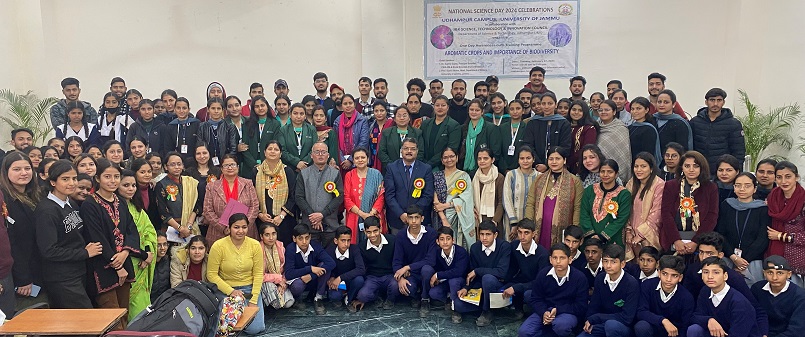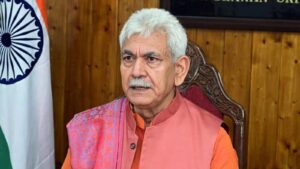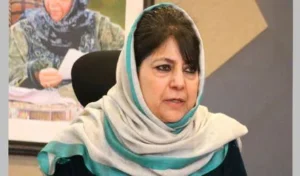National Science Day 2024 observed at JU Udhampur Campus
Speakers call for promoting Aromatic crops, biodiversity & Indigenous Technology interventions to achieve Viksit Bharat

UDHAMPUR, FEBRUARY 27: To spread awareness and significance of science and its application in people’s daily life and exposing the stakeholders to new technologies being promoted as a step towards Viksit Bharat, Udhampur Campus, University of Jammu, in collaboration with the JK Science, Technology and Innovation Council (JKSTIC), Department of Science and Technology, organised a “One Day Awareness-cum-Training Programme on “Aromatic Crops and importance of Biodiversity” on the eve of National Science Day 2024.
Dr. Suphla Gupta, Principal Scientist at CSIR-Indian Institute of Integrative Medicine (IIIM), Jammu & Nodal Scientist Aroma Mission III and Prof Susheel Verma, Head, Department of Botany, University of Jammu, Jammu were the expert speakers and resource persons while the special guest Shruti Khanna, Assistant Director, represented the JK STIC, Udhampur.
In her presentation on the Importance of aromatic Crops for empowerment of society, Dr.Suphla Gupta highlighted the important contribution of Aroma Mission in the growth, nurturing, and positioning of the essential oil-based aroma business in the nation. Dr. Gupta stated, “The aroma mission has established a strong ecosystem that benefits the industry, farmers, and young entrepreneurs”. Both productivity and income of the farmers are increasing, and their lives are changing as a result of the employment of indigenous technology and scientific interventions in the areas of agriculture, processing, and product development. She shared several inspiring success stories of the young entrepreneurs across Jammu & Kashmir who are involved in the cultivation, processing, value addition, and marketing of highly lucrative aromatic and medicinal plants like lemon grass, Rosa grass, tulsi, mint, marigold, monarda, and other aromas based plants.
In the afternoon session, Prof Susheel Verma spoke on the “Importance of biodiversity and its conservation in the era of climate change”. Biodiversity is indispensable for our well-being and prosperity. Therefore, protecting the cultivated and wild crops and their pollinators like honeybees, beetles and other insects are very much helpful for us as well as the ecosystem, as our survival depends on them”, said Prof Verma. He enlightened the audience about the role of conservation organizations such as IUCN, CITES, etc., in protecting the diverse flora and fauna.
In her address, Mrs. Shruti Khanna, highlighted the major initiatives and activities undertaken by the DST, J&K, all over Jammu & Kashmir for the upliftment and development of the local communities. She thanked the Udhampur Campus faculty and staff for working together to arrange the “One Day Awareness-cum-Training Programme on “Aromatic Crops and significance of Biodiversity.”
Earlier, Prof Yash Pal Sharma while conveying his gratitude to Prof. Umesh Rai, Hon’ble Vice Chancellor, University of Jammu, for his stewardship and unwavering support in the development and advancement of the Udhampur Campus, he extended warmly welcome to the resource persons and the participants and hoped that such efforts will be helpful in making India ‘AtmNirbhar’ and Viksit Bharat as envisaged by our Hon’ble Prime minister of India, Sh. Narinder Modi.
The mega event was attended by the JK STIC representative, the faculty and students of Bhaskar Degree College, Kalra College of Education, and the local schools in the village of Garnai-Lotta, as well as members of the civil society, members of the local bodies, and progressive women agri-entrepreneurs including Mrs Vimla, Mrs Santosh Jamwal, Mr. Dalip and the faculty members and students of Udhampur Campus. The proceedings of the program were conducted by Ms. Tarun Dubey, DrAnushka Singh extended warm welcome to the guests and participants while the formal vote of thanks was presented by Dr. Shilpa Gupta.
Every year the National Science Day is celebrated to honour the discovery of “Raman Effect” on 28th February, 1928 by the Indian Physicist Sir ChandrasekharaVenkata Raman, the first Asian scientist to bag the Nobel Prize in Physics in the year 1930.








